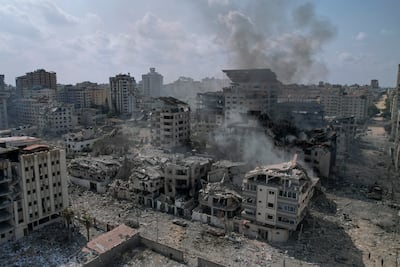India strongly condemns terrorist attacks on Israel, Prime Minister Narendra Modi said on Tuesday after receiving a phone call from his Israeli counterpart Benjamin Netanyahu amid an escalation with Gaza-based militants that has claimed more than 1,600 lives in three days.
Mr Modi, who shares a great rapport with Mr Netanyahu, said India stood firmly with Israel.
“I thank Prime Minister Netanyahu for his phone call and providing an update on the continuing situation. People of India stand firmly with Israel in this difficult hour. India strongly and unequivocally condemns terrorism in all its forms and manifestations,” he said.
Mr Modi earlier expressed “shock" and affirmed India's solidarity with Israel over the cross-border attack by Hamas militants on Saturday that is reported to have killed more than 900 people.
The main opposition party, the Indian National Congress, has called for an immediate ceasefire between Israel and Hamas and said it has a long-standing support "for the rights of the Palestinian people to land, self-government and to live with dignity and respect".
India now has a strong strategic and diplomatic partnership with Israel but for decades maintained a balancing act between Israel and Palestine, with which it also shares historical ties.
The South Asian nation was the only non-Arab state among the 13 that voted against the creation of Israel under a UN partition plan for Palestine, in the General Assembly in 1948.
It only recognised Israel two years later and formally established diplomatic relations only in 1992, when it opened an embassy in Tel Aviv.

India’s first prime minister Jawaharlal Nehru was opposed to the idea of another nation built on religious nationalism, after the subcontinent was divided between India and Islamic Republic of Pakistan following its independence from the British.
Former Indian prime minister Atal Bihari Bajpayee, from Mr Modi's right-wing Bharatiya Janata Party, had also supported Palestine’s cause and once said that "Israel will have to vacate the land occupied by the Arabs” in a speech in 1977 when he was the country’s foreign minister.
However, after Mr Modi came to power in 2014, New Delhi gradually decoupled the Israel-Palestine issue and bolstered its relationship with Israel, particularly in defence and strategic areas.
In 2017, Mr Modi became the first Indian prime minister to visit Israel.
New Delhi has abstained from voting on UN resolutions against Israel in recent years, including one at the Human Rights Council last year that condemned Israeli actions in the occupied Palestinian territories.
Israel has about 85,000 Jews of Indian origin, who started emigrating there in the 1950s and 1960s, and nearly 18,000 Indian citizens, a majority of whom are caregivers, IT professionals and students.
New Delhi said that it is monitoring the situation and will launch an evacuation mission for stranded citizens. Officials have said that no incident of violence or injury to any Indian has been reported yet.


